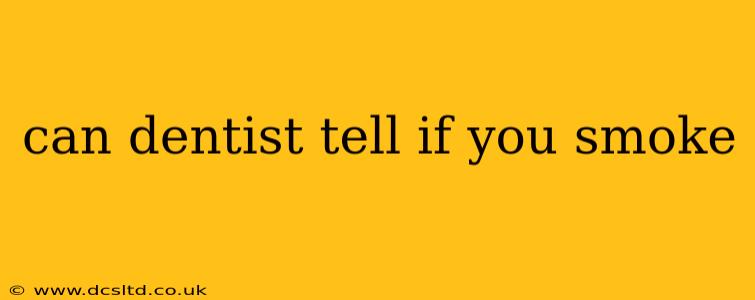Can a Dentist Tell if You Smoke?
Yes, dentists can often tell if you smoke, and it's not just from the smell. While the telltale odor of cigarette smoke on your breath is a strong indicator, there are several other visible signs that a dentist can readily identify during a routine examination. This article will explore the various ways dentists detect smoking and the impact it has on oral health.
What are the visible signs a dentist looks for?
Dentists are trained to recognize the oral manifestations of smoking, which often present as distinct characteristics during a check-up. These include:
-
Stained Teeth: This is perhaps the most obvious sign. Nicotine and tar in cigarettes stain teeth a yellowish-brown, sometimes even a dark brown or gray. The staining is often more pronounced on the inner surfaces of the teeth, near the gums. The intensity of staining often correlates with the duration and intensity of smoking.
-
Gum Disease (Periodontitis): Smoking significantly increases the risk of developing gum disease. Dentists will check for signs of inflammation, bleeding gums, gum recession, and loss of bone supporting the teeth. Smokers often present with more severe gum disease than non-smokers, even at a younger age.
-
Halitosis (Bad Breath): The persistent unpleasant odor is a classic indicator. While many things can cause bad breath, the characteristic smell of cigarette smoke is hard to miss. This odor can linger even after brushing and flossing.
-
Oral Cancer Lesions: Smoking is a major risk factor for oral cancer. Dentists meticulously examine the oral mucosa (the lining of the mouth) during routine check-ups to detect any suspicious lesions, ulcers, or white or red patches that could be indicative of precancerous or cancerous changes. Early detection is crucial for successful treatment.
-
Delayed Healing: Smoking impairs the body's ability to heal, which dentists can observe if a patient has undergone any recent oral procedures. Wound healing will be noticeably slower in smokers compared to non-smokers.
How can a dentist differentiate between smoking and other causes of stained teeth?
While certain foods and drinks can stain teeth, the staining pattern caused by smoking is usually distinct. The staining from smoking is typically more pervasive and concentrated on the inner surfaces of the teeth, unlike the surface staining from coffee, tea, or wine. Furthermore, the combination of staining with other oral health issues like gum disease strongly suggests smoking. A thorough examination and patient history help differentiate the causes.
What if I'm a passive smoker? Can a dentist tell?
While the effects might be less pronounced, passive smoking can still have an impact on oral health. Dentists might observe milder staining or a slightly increased risk of gum disease in individuals exposed to secondhand smoke. However, the signs won't be as obvious as in active smokers.
What should I do if my dentist suspects I smoke?
Open and honest communication with your dentist is crucial. They're not judging you; they're concerned about your oral health. They can provide advice on how to quit smoking and maintain optimal oral hygiene, and they can help address any concerns arising from the effects of smoking on your mouth and teeth.
This information is for general knowledge and does not constitute medical advice. Always consult with a dental professional for any concerns about your oral health.
